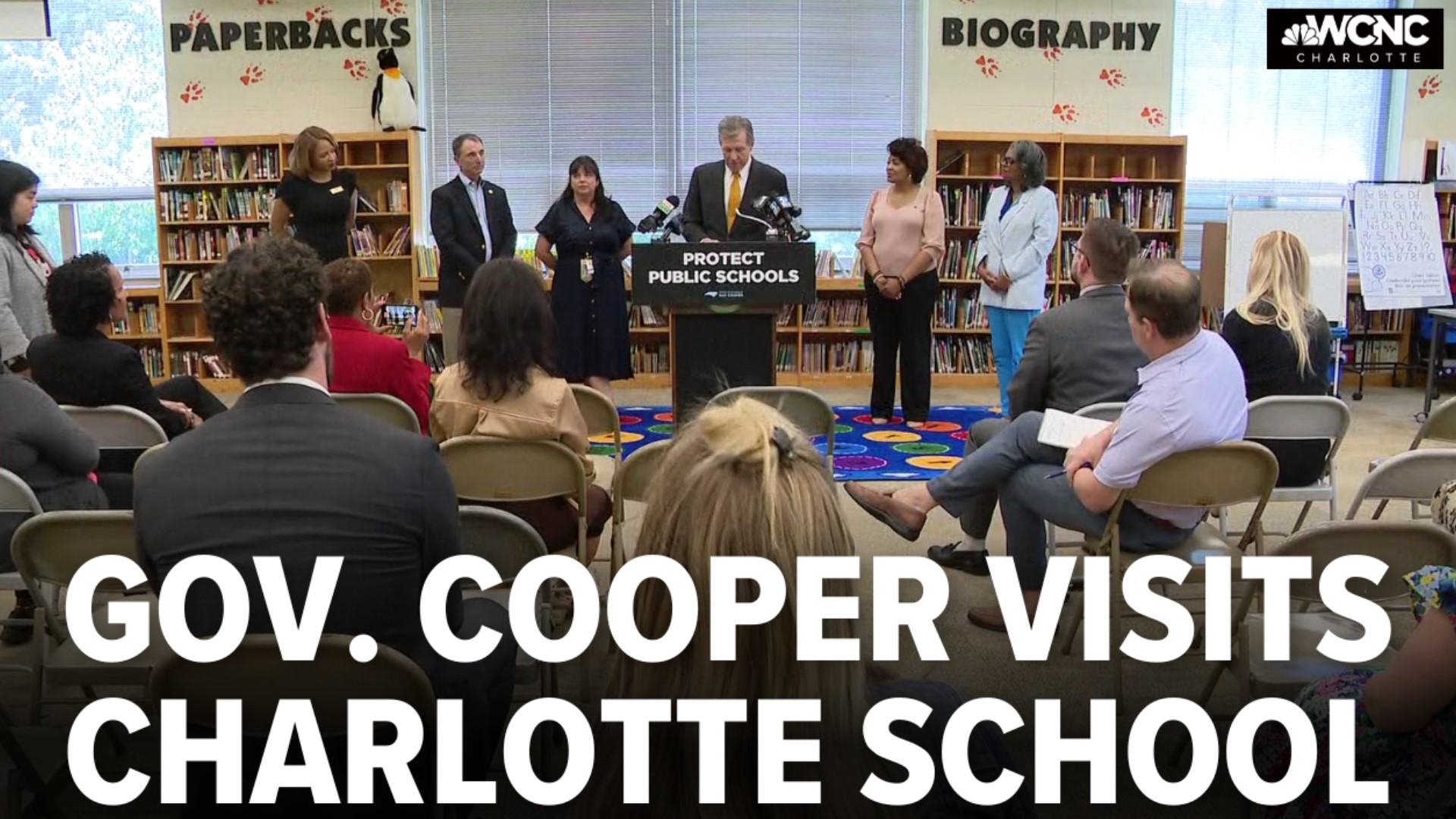CHARLOTTE, N.C. — Gov. Roy Cooper visited Charlotte Wednesday after calling on more to be done to protect public schools.
Cooper stopped by Huntingtowne Farms Elementary School Wednesday afternoon to express concerns over the fate of the state's public schools if current legislation passes the General Assembly.
On Monday, Cooper called for a "state of emergency" for public education. While he noted it was not an official declaration, Cooper noted North Carolinians should take immediate action to prevent a proposed state budget from passing that would amp up the money given to people seeking to send their children to private schools.
The bill, which passed the state House, centers on a private school voucher system in which families would receive a subsidy if they choose to send their child to a private school.
"I'm concerned that some legislators have given up on our public schools and so instead, they are going to choke the life out of them," Cooper said.
The bill would help families regardless of race, neighborhood, or income.
"When you have a private school voucher scheme on steroids that allows millionaires to get a check for sending the kid to a private Catholic [school] that they were gonna do anyway, something's off," Cooper said.
Critics of the governor's claims said it's ultimately about the student and not the system.
Former North Carolina legislator and current UNC Board of Governors member Joel Ford told WCNC Charlotte the main reason he's behind the "choose your school, choose your future" legislation, is because "no one knows better what a child needs than a parent."
"That may look like a public school, it may look like a private school, it may look like a charter school," Ford said. "But the family should be able to choose."
Ford also said public school advocates are concerned about the wrong thing.
"You got 80% of Black and brown children in the state that can't read by third grade," Ford said.
Data based on state testing for the 2021-22 school year showed eight of the 10 lowest performing CMS schools were Title I schools with concentrations of Black and Hispanic students.
WCNC Charlotte also reached out to Representative Tricia Cotham, who helped sponsor the bill, but WCNC Charlotte has not yet heard back. She did post on Twitter on Monday, saying in part, "Education is not one-size-fits-all, and North Carolina families should have the freedom to determine what kind of education is best for them."
Cooper will hold public events across the state in the days ahead to rally parents, educators, and business leaders.
"It's not about whether children should go to private schools. It's about whether taxpayers should have to foot the bill for that at the expense of the public schools," Cooper said. "There's a lot of positive choice within our public schools, and we have limited taxpayer dollars."
The governor said the state should improve the current public school system.
"That's going to siphon a little over $3 billion from the general fund and it would directly affect a number of public schools," Cooper said.
Cooper said public school teacher pay proposals by Republicans fall way short and will fail to address a statewide teacher shortage. He argued deeper income tax cuts in the competing House and Senate budget proposals that also would benefit the highest wage earners would ultimately empty state coffers.
"That means a millionaire is going to get 5,300 bucks to send his or her kid to a private school, while a veteran public school teacher gets 250 bucks," Cooper said.
At the same time, the GOP is moving to dramatically expand the state’s K-12 private school scholarship program so that families of any income level could receive financial assistance, not just the poor and middle class.
That expansion ultimately would send over $500 million in taxpayer money annually to the Opportunity Scholarship Program. In contrast, the governor said, the Senate budget would raise base salaries for some veteran teachers by just $250 over two years.
The House proposal would raise average teacher pay by 10.2% over two years, compared with 4.5% in the Senate plan, which would lag behind recent inflation rates. Cooper's budget proposal wanted 18% average raises.
The governor also accused legislators of doing little to expand the state's prekindergarten program for at-risk children and to stabilize childcare centers. And he warned of a proposed constitutional amendment that if placed on the ballot would remove his ability to appoint nearly all members of the State Board of Education. Members would be picked in district elections instead.

